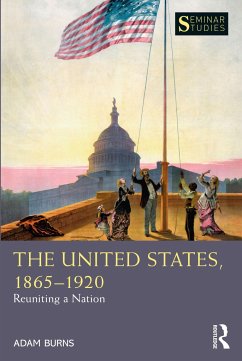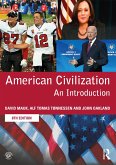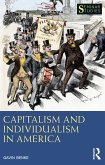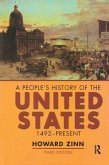- Broschiertes Buch
- Merkliste
- Auf die Merkliste
- Bewerten Bewerten
- Teilen
- Produkt teilen
- Produkterinnerung
- Produkterinnerung
The United States, 1865-1920: Reuniting a Nation explores how the U.S. attempted to heal Civil War-era divisions, as well as maintain and strengthen its unity as new rifts developed in the conflictâ s aftermath.
Andere Kunden interessierten sich auch für
![American Civilization American Civilization]() David MaukAmerican Civilization43,99 €
David MaukAmerican Civilization43,99 €![Capitalism and Individualism in America Capitalism and Individualism in America]() Gavin BenkeCapitalism and Individualism in America40,99 €
Gavin BenkeCapitalism and Individualism in America40,99 €![The American Civil War, 1861-1865 The American Civil War, 1861-1865]() Reid MitchellThe American Civil War, 1861-186557,99 €
Reid MitchellThe American Civil War, 1861-186557,99 €![A History of the American People A History of the American People]() James Truslow AdamsA History of the American People51,99 €
James Truslow AdamsA History of the American People51,99 €![Woodrow Wilson Woodrow Wilson]() Michael R. CudeWoodrow Wilson152,99 €
Michael R. CudeWoodrow Wilson152,99 €![The Origins and Evolution of Consumer Capitalism The Origins and Evolution of Consumer Capitalism]() John P. WatkinsThe Origins and Evolution of Consumer Capitalism161,99 €
John P. WatkinsThe Origins and Evolution of Consumer Capitalism161,99 €![A People's History of the United States A People's History of the United States]() Howard ZinnA People's History of the United States230,99 €
Howard ZinnA People's History of the United States230,99 €-
-
-
The United States, 1865-1920: Reuniting a Nation explores how the U.S. attempted to heal Civil War-era divisions, as well as maintain and strengthen its unity as new rifts developed in the conflictâ s aftermath.
Hinweis: Dieser Artikel kann nur an eine deutsche Lieferadresse ausgeliefert werden.
Hinweis: Dieser Artikel kann nur an eine deutsche Lieferadresse ausgeliefert werden.
Produktdetails
- Produktdetails
- Seminar Studies
- Verlag: Taylor & Francis Ltd
- Seitenzahl: 198
- Erscheinungstermin: 18. Mai 2020
- Englisch
- Abmessung: 234mm x 156mm x 11mm
- Gewicht: 314g
- ISBN-13: 9781138482425
- ISBN-10: 1138482420
- Artikelnr.: 59365947
- Herstellerkennzeichnung
- Libri GmbH
- Europaallee 1
- 36244 Bad Hersfeld
- gpsr@libri.de
- Seminar Studies
- Verlag: Taylor & Francis Ltd
- Seitenzahl: 198
- Erscheinungstermin: 18. Mai 2020
- Englisch
- Abmessung: 234mm x 156mm x 11mm
- Gewicht: 314g
- ISBN-13: 9781138482425
- ISBN-10: 1138482420
- Artikelnr.: 59365947
- Herstellerkennzeichnung
- Libri GmbH
- Europaallee 1
- 36244 Bad Hersfeld
- gpsr@libri.de
Adam Burns is a senior lecturer in History at the University of Wolverhampton. He is the author of American Imperialism (2017) and William Howard Taft and the Philippines: A Blueprint for Empire (2020).
List of illustrations
Acknowledgements
Chronology
Who's who
PART I ANALYSIS AND ASSESSMENT
1 INTRODUCTION
2 RECONSTRUCTING A NATION
Reconstruction from Lincoln to Johnson
Congressional Reconstruction
Grant's Reconstruction
3 THE ROAD TO REDEMPTION
African American rights secured?
White resistance
Rebuilding a white South
A New South?
4 THE COURSE OF WESTWARD EXPANSION
Connecting the West
Native Americans
Life in the West
5 PARTY POLITICS IN THE GILDED AGE
Reestablishing Republican governance
Republican factionalism grows
The Cleveland era
6 ROBBER BARONS AND KNIGHTS OF LABOR
Technology
The robber barons
Agrarian reaction
Urban reaction
7 THE UNITED STATES AND THE WORLD
Relations with the European empires
Relations with Latin American nations
Relations with the Asia-Pacific region
8 IMMIGRATION, ETHNICITY, AND THE CHANGING FACE OF THE NATION
Scientific racism
Immigration and new minorities
The growth of black activism
9 BRYAN, ROOSEVELT, AND THE EVOLUTION OF PARTY POLITICS
Populism and the rise of William Jennings Bryan
The progressive movement
Theodore Roosevelt: the accidental president
Taft and the Republican split of 1912
10 WILSON AND THE GREAT WAR
The New Freedom: domestic affairs before the war
Wilson, Latin America, and neutrality
The end of neutrality and peace without victory
The home front
11 CONCLUSION: THE ELECTION OF 1920 AND THE END OF AN ERA
PART II DOCUMENTS
1 Abraham Lincoln - "The Gettysburg Address" (1863)
2 Frederick Douglass - "What the Black Man Wants" (1865)
3 Fourteenth Amendment to the U.S. Constitution (1868)
4 Andrew Johnson - Veto Message Regarding Rebel State Governments (1867)
5 "Civil Rights of Freedmen in Mississippi" (1865)
6 Tom Watson - "The Negro Question in the South" (1892)
7 Booker T. Washington - "Atlanta Compromise" Speech (1895)
8 Sitting Bull - Testimony before a U.S. Senate Committee (1883)
9 Frederick Jackson Turner - "The Significance of the Frontier in American
History" (1893)
10 Rutherford B. Hayes - Presidential Inaugural Address (1877)
11 "To Republicans and Independent Voters" (1884)
12 Populist Party Platform (1892)
13 Andrew Carnegie - "Wealth" (1889)
14 Samuel Gompers - Testimony before the Senate Committee on Education and
Labor (1883)
15 Theodore Roosevelt - Corollary to the Monroe Doctrine (1904)
16 John Hay - The First "Open Door" Note (1899)
17 Philippine Declaration of Independence (1898)
18 Thomas Dixon - The Leopard's Spots (1902)
19 Reports of the Dillingham Immigration Committee (1910)
20 W. E. B. Du Bois - "The Talented Tenth" (1903)
21 William Jennings Bryan - "Cross of Gold" Speech (1896)
22 Theodore Roosevelt - "The Man with the Muck-rake" (1906)
23 Woodrow Wilson - Address to Congress Leading to a War against Germany
(1917)
24 Carrie Chapman Catt - Woman Suffrage by Federal Constitutional Amendment
(1917)
Glossary
Guide to further reading
References
Index
Acknowledgements
Chronology
Who's who
PART I ANALYSIS AND ASSESSMENT
1 INTRODUCTION
2 RECONSTRUCTING A NATION
Reconstruction from Lincoln to Johnson
Congressional Reconstruction
Grant's Reconstruction
3 THE ROAD TO REDEMPTION
African American rights secured?
White resistance
Rebuilding a white South
A New South?
4 THE COURSE OF WESTWARD EXPANSION
Connecting the West
Native Americans
Life in the West
5 PARTY POLITICS IN THE GILDED AGE
Reestablishing Republican governance
Republican factionalism grows
The Cleveland era
6 ROBBER BARONS AND KNIGHTS OF LABOR
Technology
The robber barons
Agrarian reaction
Urban reaction
7 THE UNITED STATES AND THE WORLD
Relations with the European empires
Relations with Latin American nations
Relations with the Asia-Pacific region
8 IMMIGRATION, ETHNICITY, AND THE CHANGING FACE OF THE NATION
Scientific racism
Immigration and new minorities
The growth of black activism
9 BRYAN, ROOSEVELT, AND THE EVOLUTION OF PARTY POLITICS
Populism and the rise of William Jennings Bryan
The progressive movement
Theodore Roosevelt: the accidental president
Taft and the Republican split of 1912
10 WILSON AND THE GREAT WAR
The New Freedom: domestic affairs before the war
Wilson, Latin America, and neutrality
The end of neutrality and peace without victory
The home front
11 CONCLUSION: THE ELECTION OF 1920 AND THE END OF AN ERA
PART II DOCUMENTS
1 Abraham Lincoln - "The Gettysburg Address" (1863)
2 Frederick Douglass - "What the Black Man Wants" (1865)
3 Fourteenth Amendment to the U.S. Constitution (1868)
4 Andrew Johnson - Veto Message Regarding Rebel State Governments (1867)
5 "Civil Rights of Freedmen in Mississippi" (1865)
6 Tom Watson - "The Negro Question in the South" (1892)
7 Booker T. Washington - "Atlanta Compromise" Speech (1895)
8 Sitting Bull - Testimony before a U.S. Senate Committee (1883)
9 Frederick Jackson Turner - "The Significance of the Frontier in American
History" (1893)
10 Rutherford B. Hayes - Presidential Inaugural Address (1877)
11 "To Republicans and Independent Voters" (1884)
12 Populist Party Platform (1892)
13 Andrew Carnegie - "Wealth" (1889)
14 Samuel Gompers - Testimony before the Senate Committee on Education and
Labor (1883)
15 Theodore Roosevelt - Corollary to the Monroe Doctrine (1904)
16 John Hay - The First "Open Door" Note (1899)
17 Philippine Declaration of Independence (1898)
18 Thomas Dixon - The Leopard's Spots (1902)
19 Reports of the Dillingham Immigration Committee (1910)
20 W. E. B. Du Bois - "The Talented Tenth" (1903)
21 William Jennings Bryan - "Cross of Gold" Speech (1896)
22 Theodore Roosevelt - "The Man with the Muck-rake" (1906)
23 Woodrow Wilson - Address to Congress Leading to a War against Germany
(1917)
24 Carrie Chapman Catt - Woman Suffrage by Federal Constitutional Amendment
(1917)
Glossary
Guide to further reading
References
Index
List of illustrations
Acknowledgements
Chronology
Who's who
PART I ANALYSIS AND ASSESSMENT
1 INTRODUCTION
2 RECONSTRUCTING A NATION
Reconstruction from Lincoln to Johnson
Congressional Reconstruction
Grant's Reconstruction
3 THE ROAD TO REDEMPTION
African American rights secured?
White resistance
Rebuilding a white South
A New South?
4 THE COURSE OF WESTWARD EXPANSION
Connecting the West
Native Americans
Life in the West
5 PARTY POLITICS IN THE GILDED AGE
Reestablishing Republican governance
Republican factionalism grows
The Cleveland era
6 ROBBER BARONS AND KNIGHTS OF LABOR
Technology
The robber barons
Agrarian reaction
Urban reaction
7 THE UNITED STATES AND THE WORLD
Relations with the European empires
Relations with Latin American nations
Relations with the Asia-Pacific region
8 IMMIGRATION, ETHNICITY, AND THE CHANGING FACE OF THE NATION
Scientific racism
Immigration and new minorities
The growth of black activism
9 BRYAN, ROOSEVELT, AND THE EVOLUTION OF PARTY POLITICS
Populism and the rise of William Jennings Bryan
The progressive movement
Theodore Roosevelt: the accidental president
Taft and the Republican split of 1912
10 WILSON AND THE GREAT WAR
The New Freedom: domestic affairs before the war
Wilson, Latin America, and neutrality
The end of neutrality and peace without victory
The home front
11 CONCLUSION: THE ELECTION OF 1920 AND THE END OF AN ERA
PART II DOCUMENTS
1 Abraham Lincoln - "The Gettysburg Address" (1863)
2 Frederick Douglass - "What the Black Man Wants" (1865)
3 Fourteenth Amendment to the U.S. Constitution (1868)
4 Andrew Johnson - Veto Message Regarding Rebel State Governments (1867)
5 "Civil Rights of Freedmen in Mississippi" (1865)
6 Tom Watson - "The Negro Question in the South" (1892)
7 Booker T. Washington - "Atlanta Compromise" Speech (1895)
8 Sitting Bull - Testimony before a U.S. Senate Committee (1883)
9 Frederick Jackson Turner - "The Significance of the Frontier in American
History" (1893)
10 Rutherford B. Hayes - Presidential Inaugural Address (1877)
11 "To Republicans and Independent Voters" (1884)
12 Populist Party Platform (1892)
13 Andrew Carnegie - "Wealth" (1889)
14 Samuel Gompers - Testimony before the Senate Committee on Education and
Labor (1883)
15 Theodore Roosevelt - Corollary to the Monroe Doctrine (1904)
16 John Hay - The First "Open Door" Note (1899)
17 Philippine Declaration of Independence (1898)
18 Thomas Dixon - The Leopard's Spots (1902)
19 Reports of the Dillingham Immigration Committee (1910)
20 W. E. B. Du Bois - "The Talented Tenth" (1903)
21 William Jennings Bryan - "Cross of Gold" Speech (1896)
22 Theodore Roosevelt - "The Man with the Muck-rake" (1906)
23 Woodrow Wilson - Address to Congress Leading to a War against Germany
(1917)
24 Carrie Chapman Catt - Woman Suffrage by Federal Constitutional Amendment
(1917)
Glossary
Guide to further reading
References
Index
Acknowledgements
Chronology
Who's who
PART I ANALYSIS AND ASSESSMENT
1 INTRODUCTION
2 RECONSTRUCTING A NATION
Reconstruction from Lincoln to Johnson
Congressional Reconstruction
Grant's Reconstruction
3 THE ROAD TO REDEMPTION
African American rights secured?
White resistance
Rebuilding a white South
A New South?
4 THE COURSE OF WESTWARD EXPANSION
Connecting the West
Native Americans
Life in the West
5 PARTY POLITICS IN THE GILDED AGE
Reestablishing Republican governance
Republican factionalism grows
The Cleveland era
6 ROBBER BARONS AND KNIGHTS OF LABOR
Technology
The robber barons
Agrarian reaction
Urban reaction
7 THE UNITED STATES AND THE WORLD
Relations with the European empires
Relations with Latin American nations
Relations with the Asia-Pacific region
8 IMMIGRATION, ETHNICITY, AND THE CHANGING FACE OF THE NATION
Scientific racism
Immigration and new minorities
The growth of black activism
9 BRYAN, ROOSEVELT, AND THE EVOLUTION OF PARTY POLITICS
Populism and the rise of William Jennings Bryan
The progressive movement
Theodore Roosevelt: the accidental president
Taft and the Republican split of 1912
10 WILSON AND THE GREAT WAR
The New Freedom: domestic affairs before the war
Wilson, Latin America, and neutrality
The end of neutrality and peace without victory
The home front
11 CONCLUSION: THE ELECTION OF 1920 AND THE END OF AN ERA
PART II DOCUMENTS
1 Abraham Lincoln - "The Gettysburg Address" (1863)
2 Frederick Douglass - "What the Black Man Wants" (1865)
3 Fourteenth Amendment to the U.S. Constitution (1868)
4 Andrew Johnson - Veto Message Regarding Rebel State Governments (1867)
5 "Civil Rights of Freedmen in Mississippi" (1865)
6 Tom Watson - "The Negro Question in the South" (1892)
7 Booker T. Washington - "Atlanta Compromise" Speech (1895)
8 Sitting Bull - Testimony before a U.S. Senate Committee (1883)
9 Frederick Jackson Turner - "The Significance of the Frontier in American
History" (1893)
10 Rutherford B. Hayes - Presidential Inaugural Address (1877)
11 "To Republicans and Independent Voters" (1884)
12 Populist Party Platform (1892)
13 Andrew Carnegie - "Wealth" (1889)
14 Samuel Gompers - Testimony before the Senate Committee on Education and
Labor (1883)
15 Theodore Roosevelt - Corollary to the Monroe Doctrine (1904)
16 John Hay - The First "Open Door" Note (1899)
17 Philippine Declaration of Independence (1898)
18 Thomas Dixon - The Leopard's Spots (1902)
19 Reports of the Dillingham Immigration Committee (1910)
20 W. E. B. Du Bois - "The Talented Tenth" (1903)
21 William Jennings Bryan - "Cross of Gold" Speech (1896)
22 Theodore Roosevelt - "The Man with the Muck-rake" (1906)
23 Woodrow Wilson - Address to Congress Leading to a War against Germany
(1917)
24 Carrie Chapman Catt - Woman Suffrage by Federal Constitutional Amendment
(1917)
Glossary
Guide to further reading
References
Index








